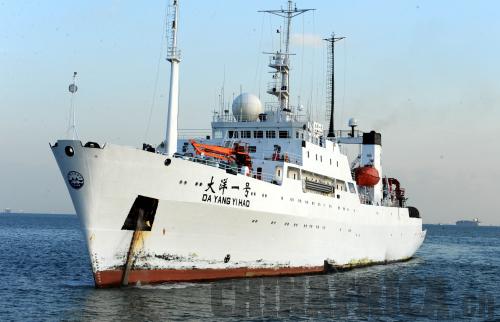| 
The crew of China's Ocean One ship came home from a long journey at the tail end of 2012 after 245 days of sailing the Atlantic Ocean to and from Nigeria. The voyage researching marine biodiversity was significant for China in many ways: Ocean One is the country's only open-ocean ship designed for deep sea research, and its journey marked the first time a Chinese research team led an operation in an African country's exclusive economic zone. Most importantly, the 38,000 nautical mile-long voyage included the first Sino-Nigerian joint oceanographic cruise and marked the first time marine scientists from China and Nigeria worked side-by-side in the field.
In August, the Ocean One set out on a nine-day exploration and research mission in Nigeria's waters. Fifteen Nigerians, comprising nine scientists and six crew members, joined the 66 Chinese crew members on board and explored Nigeria's western waters. Captain Cao Yezheng said during a reception in Lagos that the mission was successful, and that the team was able to conduct a thorough oceanic survey. "We were able to understand the water chemistry, understand the sea channel, the fishery conditions and some other areas that needed to be touched on," said Cao. Among the team's findings were a rare crab species and a newly-discovered undersea rock.
Nigerian scientists were equally enthusiastic about the cooperation. E. A. Ajao, Director of the Nigerian Institute of Oceanography and Marine Research, said that the trip was an important first step for Sino-Nigerian scientific cooperation. "This exercise will promote development and cooperation in other areas of marine science and technology in the nearest future for ocean resource and exploration, ocean disaster reduction, satellite and remote sensing, climate change research, integrated coastal zone management and related research and training," said Ajao.
Research collected on the trip provided Nigeria with valuable information on its sea's fishing conditions and underwater landscape. The ship departed from and returned to Apapa Harbor in Lagos, and was welcomed by hundreds of enthusiastic Nigerians and Chinese upon its return.
But the joint Nigerian mission was only one segment of the Ocean One's long voyage. The Chinese expedition team, who left Sanya, Hainan Province, in April of last year and returned in December, made several important discoveries that will enrich China's understanding of marine diversity. Another purpose of the trip was to research hydrothermal activity. Hydrothermal activity is the activity of heated water under the earth. It usually implies volcanic magma chambers, and studying this activity allows scientists to learn more about groundwater movement and the nature of these magma chambers.
The Ocean One team became the first in the world to discover an inactive hydrothermal seafloor area in a northwest ridge of the Indian Ocean. They also found hydrothermal seafloor activity in the North Atlantic, near the equator, and several other hydrothermal and geological anomalies. Finding these anomalies and hydrothermal areas provided scientists with a variety of samples and geological, biological, environmental and geophysical data. Monitoring and comparing hydrothermal activity gives scientists a better understanding of geology and marine biodiversity in different parts of the world.
Though the Chinese expedition team made great accomplishments in their voyage, they made the greatest cooperative strides in Nigeria. Considering the success of the Nigerian and Chinese scientists' joint research during the Ocean One's voyage, it seems that the two countries will have more opportunities to work together in scientific research and particularly, marine biodiversity and geology. CA
Tech Bytes
» Approximately one third of adults worldwide had home access to the Internet in 2011, according to a Gallup survey, up from 29 percent in 2010. Sweden and Singapore tied for the highest rate of 93 percent; in China, 34 percent of the population had home access to the Internet. |